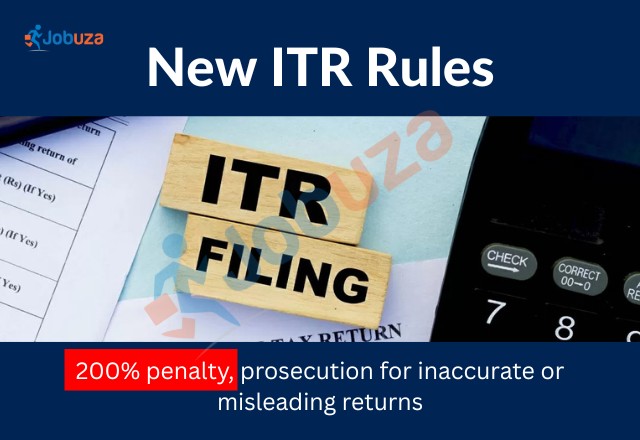New ITR Rules: Up to 200% Penalty and Prosecution for False Claims or Misreporting Income
New ITR Rules: The Income Tax Department has announced strict new regulations for the 2024-25 assessment year. Taxpayers who misreport income, claim false deductions, or submit inaccurate Income Tax Returns (ITRs) could face a penalty of up to 200% of the tax due. Additionally, 24% annual interest and even prosecution under Section 276C of the Income Tax Act may apply.
This move aims to improve accuracy and transparency in tax filings. All taxpayers, regardless of income type or filing method, are expected to comply strictly with the new norms.
Taxpayer Responsibility
One of the key highlights of the new rule is that the taxpayer alone is held responsible for any errors, even if the mistake was made by a chartered accountant or tax consultant. This means:
- Double-check every entry before filing.
- Ensure all deductions and exemptions are legitimate and backed by documents.
- Do not rely blindly on third-party preparers.
Who Does This Apply To?
The rule applies across all categories:
- Salaried employees
- Freelancers
- Professionals
- Businesses
Everyone is equally liable for incorrect returns.
Common Mistakes to Avoid
Taxpayers should be cautious to avoid errors that may trigger penalties:
- Selecting the wrong ITR form
- Claiming deductions without proper proof
- Hiding secondary income sources
- Misclassifying personal expenses as business-related
Even if a revised return is filed, the penalty will still apply if the original submission had false information. Simply correcting it later does not cancel the consequences.
How to Stay Compliant
To avoid penalties and legal trouble:
- Match all income details with your Annual Information Statement (AIS)
- Keep valid proof for every deduction claimed
- Maintain organized records
- Meet all filing deadlines
Choosing the Right ITR Form
Filing with the wrong form can invalidate your return. Here is a quick overview of the forms and their correct usage:
ITR-1 (Sahaj) For resident individuals earning up to ₹50 lakh from salary, one house property, and other sources.
ITR-2 For individuals and HUFs with income over ₹50 lakh or more than one house property. Not for business income.
ITR-3 For individuals and HUFs with income from business or profession.
ITR-4 (Sugam) For resident individuals, HUFs, and firms with presumptive income up to ₹50 lakh.
ITR-5 For firms, LLPs, AOPs, and BOIs.
ITR-6 For companies not claiming exemption under Section 11.
ITR-7 For entities like charitable trusts, political parties, scientific institutions, and educational institutions.
Final Advice
Taxpayers should:
- Never file returns in haste.
- Consult a trusted tax advisor.
- Keep personal and financial data updated across all records.
Understanding the new rules and filing carefully is essential. A small error can now result in serious financial and legal consequences.
To ensure compliance, stay informed and make accuracy your top priority during this ITR season.



